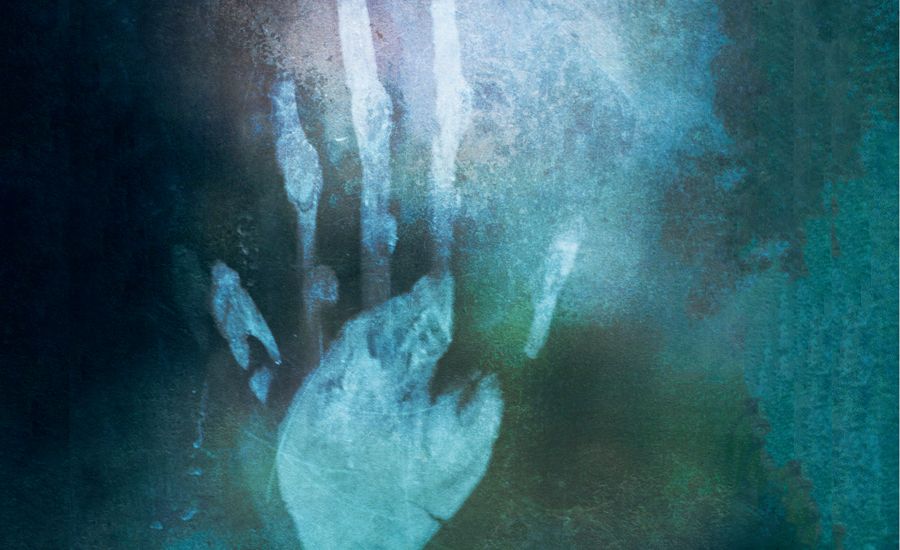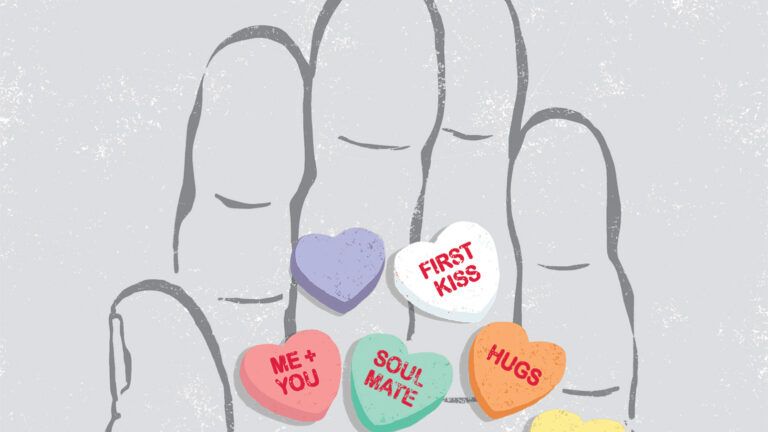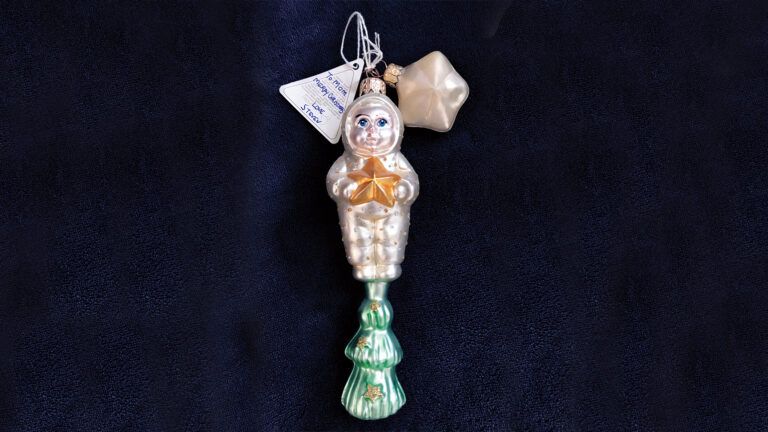My husband, Max, died at 12:44 p.m. on a sunny Saturday in May, surrounded by friends and family in the living room of our Sacramento home. His last breaths were labored. He lay on a narrow hospital bed, his emaciated body propped up to face the patio doors so he could feel the warmth of the sun.
I held his hand gently—gently because it felt like all bone, not the hand that had held mine with such strength for the past five years—and read from the Twenty-third Psalm. “He makes me lie down in green pastures, he leads me beside quiet waters….”
A lovely melody suffused the room. Tones so resonant and deep, they could have been coming from one of Max’s classical CDs. I turned and saw the heavy wind chimes over the patio swaying. But the air was still. Not a breath of wind at all. There was no breath from Max either. His hand fell from mine. He was gone.
In late November, Max had received the diagnosis: esophageal cancer, late stage. He didn’t want to die in a hospital. We’d made him as comfortable as we could at home.
We’d sit overlooking our yard and talk. About Tanner, my son from my first marriage, whom Max treated as his own. About music, good food and wine, philosophy—his passions. About the trips we’d taken, like the one to Auberge du Soleil, a resort in Napa Valley, where he’d first told me he loved me. These things were easier to talk about than the future.
I was 53. I’d thought we’d grow old together. Now? “It’s easier for me,” Max said one day. “It will be harder for you because you are being left behind.”
“I don’t know what I’ll do,” I said.
“I will still be here,” he insisted. “My love will never die. It’s immutable.”
What did Max mean? He’d never talked like that. I was the daughter of a Presbyterian minister, but Max was an agnostic. The Twenty-third Psalm was music to him, not Scripture. The idea that anything but a memory of someone could survive death didn’t appeal to his sense of reason.
I couldn’t fault him for it. His intellectual rigor was one thing that had attracted me to him.
I’d met Max in 1999, a year and a half after I’d moved to Sacramento to become the publisher of the Sacramento Bee, one of California’s largest and most respected newspapers. I was divorced, with a nine-year-old son. I didn’t have time for love.
Then Max invited me to a meet-and-greet event held by the political-consulting firm he worked for. I declined—obvious conflict of interest for the newspaper— but agreed to a friendly lunch.
He was a true Renaissance man: an Air Force vet, a mathematician, an accomplished chef, a former college weight lifter. He played trumpet and piano and had even written his own symphony. He read at least a book a week. He astonished me.
Eight months later, we were married. Max, Tanner and I built a home together, a life. Two weeks before our fourth wedding anniversary, we discovered that that life was nearing an end.
In his final months, Max spent a great deal of time with our friend and his caretaker, Helen. He’d insisted that I continue working, so Helen was there when I couldn’t be.
One day she revealed the strangest thing. The two of them were in the kitchen when there was a brief sun shower. “We both stopped and looked,” Helen said. “I told him, ‘I know you don’t believe in God, but this is something God created for us today. If you can find a way, let us know that there’s something out there, that it doesn’t just end.’”
“I will,” Max said. “But it will be up to you two to see it.”
Max said that? I believed in heaven, as my father had understood it, a faraway place filled with love. Max never did. But the nearer death drew, the more cautiously open he became to the notion that there could be more, as if a force stronger than his reason were reaching through to him. He spoke with less certainty about the end. The day before he died, weak and fading, he asked for directions. “Where, Max?” I asked, confused. “To the place I’m going,” he explained.
The afternoon Max died, some friends took Tanner. I waited for the funeral-home staff. I retreated to the master bedroom to try to compose myself. I flipped on the light, but the bulb above the sink had burned out. “I thought these things were supposed to last forever,” I grumbled.
We held Max’s funeral at a church in downtown Sacramento. A friend conducted the service, and people filled the pews. Tanner and the other pallbearers carried Max’s coffin to the front of the sanctuary. I was set to follow behind with my brother and sister-in-law. Will I make it through this? I wondered. Will I fall apart?
Suddenly a sound boomed through the sanctuary. A heavy door to an anteroom had slammed shut. No one was near it. It shocked me out of the downward spiral I was in.
Only back home did I think about the music of the chimes on that windless afternoon. The burned-out bulb. The slamming door. What was going on? The newspaperwoman in me said, “Nothing at all.” A flying bird could have brushed the chimes. We hadn’t changed the bathroom bulb since we’d moved in. A draft in the church could be strong enough to slam the heavy door. Max was logical to a fault. He’d guffaw at “signs” like these.
It was grief that made me notice more little things. Lights flickering when it wasn’t even stormy. Noises coming from the guest bedroom, where Max had slept for most of the last month. One morning, I returned home after taking our yellow Lab for a walk, and glanced up at the large clock over our fireplace. It should have read eight o’clock. Instead, the hands had stopped—at 12:44.
Father’s Day. Tanner was with his dad. I was home alone, listening to Celine Dion’s “Because You Loved Me,” the song we’d played at Max’s funeral. I felt agitated. I wandered into the library, full of Max’s books. I randomly pulled one from the shelf. An envelope fell to the floor. On the front was a woman’s handwriting. It was a card from Max’s mother, from Father’s Day the year before. “I’ve never seen you this happy in your life,” she’d written. “It’s because you have a family.”
I could explain any one of these things, but all of them together? I decided to keep a list of every odd incident, weird feeling and comforting coincidence. Maybe if I saw everything on paper, I’d begin to make sense of it.
I gave away most of Max’s possessions, because that was what he wanted, but it felt like giving away parts of him. His albums and books I donated to the library. His clothes and shoes I gave to Goodwill, saving a few favorite ties and shirts for Tanner. The least important things were the hardest to deal with. His round tortoiseshell glasses, his worn black leather wallet, a tiny hairbrush that he used every morning. They seemed to bear his imprint, his touch. I was beginning to forget what it felt like back when his hands were still strong, when he held mine in his.
Tanner and I didn’t plan anything for the first anniversary of Max’s death. Just a quiet day at home. We sat at a table in the backyard; I caught up on work, Tanner read a book. After a while I went inside to make us a snack. On the way to the kitchen, I paused at the doorway of the guest-bedroom suite. Something drew me inside. I turned toward the bathroom and flipped on the light.
On the mirror was a handprint.
It was no ordinary handprint. Not something revealed by the steam of a shower or left behind by someone’s greasy fingers. It was made of a soft, powdery substance and perfectly formed: I could see every fingerprint, every crease, the life line and love line. It showed all the facets of bone structure, like an X-ray. I’d combed my hair in front of that mirror just hours before. The hand hadn’t been there.
I shouted for Tanner. He came running. “What’s wrong, Mom?” He saw it too. It wasn’t just my imagination.
“You didn’t do this, did you?” I asked.
“No,” he said. He held his hand up to the mirror, so small in comparison. “Where did it come from?”
I didn’t have an answer, any reasonable explanation. But I knew whose hand it was. The same hand I’d held a year earlier, except this was the way I preferred to remember it. The hand that had once pressed the keys of a piano and thumbed through the books in our library. Max’s hand.
I got my camera and took a picture, afraid the image would fade. But it didn’t. It remained until that Wednesday, when Helen came to clean the house. “Do you want me to leave it there?” she asked, astounded.
I did, but it was time to say goodbye. Max had already given me enough to hold on to. Just as he’d promised—if only we were willing to see.
See more signs from beyond that Max never really left Janis.






